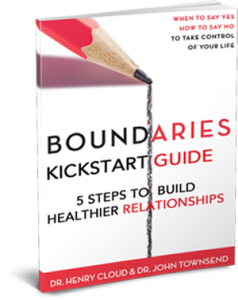Henry Cloud's Blog, page 25
February 12, 2015
Boundaries Q&A with Dr. John Townsend: Handling Guilt Comments from a Parent
 Question: Dr. Townsend, my mother makes snide comments that she will threaten to harm herself if I don’t come home for every major holiday and her birthday throughout the year. How am I supposed to respond to her comments?
Question: Dr. Townsend, my mother makes snide comments that she will threaten to harm herself if I don’t come home for every major holiday and her birthday throughout the year. How am I supposed to respond to her comments?
I’m sorry to hear about your situation. It’s not funny, and is actually troubling, for a mom to make these sort of comments, even if she says she is joking. A part of us will always wonder how serious this is. The great majority of the time, these “guiltifying” statements are actually indirect expressions of disappointment, sadness or frustration that the person does not feel safe admitting.
The best approach is to wait until a pleasant time (not in the heat of battle or an argument) and say:
“Mom, I know it’s sometimes hard that I can’t be home for some of our special family events. I miss you too, but my priorities are that I have to do other things. However, when we talk about it, you make jokes about hurting yourself. I know you mean well, but they come across confusing to me when you say them and they aren’t funny to me. I’d like to ask you if you would be more vulnerable and direct about how you talk about my schedule. Maybe that you’re disappointed, or sad, or frustrated? Those are OK feelings for us to talk about, and I’d really like to hear you out. I think us talking in this way would connect us better and deeper. What do you think about this idea?”
Most moms are happy to have their adult child welcome their own negative feelings and hurts, and that will help her make the change.
If you still find it difficult to have a boundary-setting conversation with your mom, I recommend reading these resources:
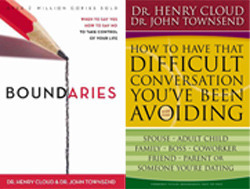 Boundaries
Boundaries
Chapter 7 – “Boundaries and Your Family”
How to Have That Difficult Conversation You’ve Been Avoiding
Chapter 24 – “With a Parent”
Click on the book title links above for details and purchasing
Got a question for Dr. Townsend? Send them to us via email at: BoundariesBooksTeam@gmail.com
Due to Dr. Townsend’s busy schedule, not all questions will be able to be addressed and answered.
The post Boundaries Q&A with Dr. John Townsend: Handling Guilt Comments from a Parent appeared first on Boundaries Books.
February 9, 2015
Why Say No to Sex?
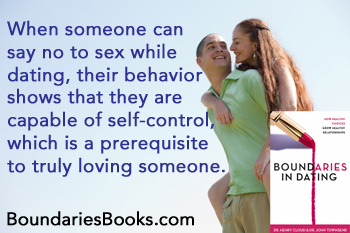 If you have hung around the church for very long, you have probably heard that God wants people to reserve sex for marriage. If you haven’t and that is news to you, then we can understand the shock you might be feeling. For many people, both inside and outside of the church, it does not make sense. If sex feels so good, and is good for the relationship, and both people are consenting, then what is the problem?
If you have hung around the church for very long, you have probably heard that God wants people to reserve sex for marriage. If you haven’t and that is news to you, then we can understand the shock you might be feeling. For many people, both inside and outside of the church, it does not make sense. If sex feels so good, and is good for the relationship, and both people are consenting, then what is the problem?
Consider this viewpoint: When someone can say no to sex outside of marriage, their behavior is a sign that he or she is capable of delaying gratification and exhibiting self-control, which are two prerequisites of the ability to love. If someone cannot delay gratification and control himself or herself in this area, what makes you think that they can delay their own gratification in other areas of sacrifice? What is going to curb the “I want what I want now” mentality in the rest of life? If someone is able to respect the limit of hearing no for sex, then that is a character sign of someone who can say no to their own desires and hungers in order to serve a higher purpose, or to love another person.
You fall in love with a person and think about making a real, committed relationship with him or her. Naturally, that is going to mean some sacrifice down the road. You are going to want to be with a person who can deny himself or herself for the sake of your relationship in many areas. Think of the areas of sacrifice that a relationship takes. There are sacrifices of time, when you might want to spend time on your favorite hobby, and yet the family needs you. There are sacrifices of money. One person may want to buy a new car, and yet the family needs money for the home. There are sacrifices of getting one’s way. One person may want to go to one place for dinner and the others want something different.
 Most importantly, there is the sacrifice that it takes to work out conflict. One person is hurt and wants to strike back in anger or hurt, yet to reconcile, the ability to put one’s own desires aside for the sake of the relationship is necessary. If someone does not have self-control and delay of gratification in pleasure, can they delay the gratification of getting his or her own way in conflict?
Most importantly, there is the sacrifice that it takes to work out conflict. One person is hurt and wants to strike back in anger or hurt, yet to reconcile, the ability to put one’s own desires aside for the sake of the relationship is necessary. If someone does not have self-control and delay of gratification in pleasure, can they delay the gratification of getting his or her own way in conflict?
Think about it. Wouldn’t you want to be with a person who can hear and respect the “no” of others? Having a boundary in sex while you are dating is a very important test to see if the person loves you. We have all heard people refer to the line “If you love me, you will.” In reality, you should say back, “If you love me, you won’t make demands that I do not feel comfortable with.” Love waits and respects, but lust must have what it wants now. Are you being loved, or are you an object of self-serving lust? Saying no is the only way to know.
We cannot overemphasize the value of dating and marrying a person who can delay their own gratification. If you are with someone who ultimately has to have what they want when they want it, you are in for a long time of misery. Choose someone who can delay gratification for the sake of you and the relationship. To the extent that he or she says, “I must have what I want now,” you are in trouble. Boundaries with sex are a sure-fire test to know if someone loves you for you.
 Get more helpful advice to build the best dating relationship and find the love of your life in Boundaries in Dating by Dr. John Townsend and Dr. Henry Cloud.
Get more helpful advice to build the best dating relationship and find the love of your life in Boundaries in Dating by Dr. John Townsend and Dr. Henry Cloud.
This week only: Get the Boundaries in Dating and Boundaries in Marriage e-books for only $2.99 each at Amazon, B&N, ChristianBook, iBooks, and Google. Click here for details
Image courtesy of stockimages at FreeDigitalPhotos.net
The post Why Say No to Sex? appeared first on Boundaries Books.
February 6, 2015
Boundaries is now a New York Times Bestseller!
 Big news!! “Boundaries” is now a New York Times bestseller! The book hit #11 on the February “Religion, Spirituality, and Faith” bestseller list. Making this list is a rare achievement and a high honor.
Big news!! “Boundaries” is now a New York Times bestseller! The book hit #11 on the February “Religion, Spirituality, and Faith” bestseller list. Making this list is a rare achievement and a high honor.
“Boundaries” was written in 1992 by Dr. Henry Cloud and Dr. John Townsend. To date, over 2 million copies have been sold. However, in the book’s 23-year history, it had yet to achieve this level of national recognition.
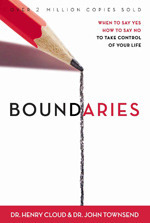 We are so grateful to share this honor with our Boundaries online audience, including the 46,000 email subscribers. Your support of “Boundaries” has made a huge difference! We want to thank you for purchasing the book, giving it as a gift to friends, and spreading word of mouth.
We are so grateful to share this honor with our Boundaries online audience, including the 46,000 email subscribers. Your support of “Boundaries” has made a huge difference! We want to thank you for purchasing the book, giving it as a gift to friends, and spreading word of mouth.
To help celebrate, we’re giving away the new “Boundaries Kickstart Guide” 17-page e-book for FREE. Click here to download your copy.
In addition, if you haven’t yet read “Boundaries,” take advantage of special 40% – 50% discounted pricing today at Amazon, Barnes & Noble, and ChristianBook. Click here to get these deals.
Since 1992, “Boundaries” has changed millions of lives. We are honored to see the book become a New York Times bestseller. All across America, people agree that boundaries make life better!
The post Boundaries is now a New York Times Bestseller! appeared first on Boundaries Books.
February 5, 2015
Get Your FREE Boundaries Kickstart Guide
Does the idea of learning to set boundaries seem overwhelming?
Do you feel too busy to read a 300-page book?
Have you read Boundaries but need a quick refresher?
Get the Boundaries Kickstart Guide! This FREE 17-page e-book boils down the concept of boundaries into 5 essential steps:
Step 1 – Understanding Boundaries
Step 2 – Setting Boundaries with Your Spouse
Step 3 – Setting Boundaries with Your Children
Step 4 – Dealing with Boundaries Resistance
Step 5 – Measuring Your Success with Boundaries
This guide covers special reading selections from Boundaries and offers insightful “Questions for Reflection” to walk you through five steps to build healthier relationships. After completing the Kickstart Guide, we think you’ll agree – boundaries make life better!
NOTE: The Boundaries Kickstart Guide accompanies the Boundaries book.
You will need a copy of Boundaries in order to use the Kickstart Guide.
To purchase a copy of Boundaries, click here.
The post Get Your FREE Boundaries Kickstart Guide appeared first on Boundaries Books.
February 1, 2015
Love Conquers All and Other Lies
 To some extent, our society is afflicted by a Hollywood distortion about relationships. Don’t get me wrong—I’m (Dr. Townsend) not anti-Hollywood. I am a movie person, and my sons are in school studying film. But we need to free ourselves of a distortion embedded in the DNA of the movie culture: passion trumps everything. That is, if you deeply connect on a romantically passionate level, you have entered relational Nirvana, and your love conquers all. This is the stuff of lots of great entertainment, but it is not how real relationships actually go to the next level.
To some extent, our society is afflicted by a Hollywood distortion about relationships. Don’t get me wrong—I’m (Dr. Townsend) not anti-Hollywood. I am a movie person, and my sons are in school studying film. But we need to free ourselves of a distortion embedded in the DNA of the movie culture: passion trumps everything. That is, if you deeply connect on a romantically passionate level, you have entered relational Nirvana, and your love conquers all. This is the stuff of lots of great entertainment, but it is not how real relationships actually go to the next level.
For example, Sharon was dating Alex, a man to whom she was extremely attracted. He had many of the qualities she looked for: the same spiritual values, warmth, lots of friends, and ambition, and it didn’t hurt that he looked like a fashion model. Plus, he was an incurable romantic, and she loved that aspect of the relationship. Alex was the king of long nights, longing glances, flowers, endearing words, and great spots to have dinner. Sharon was smitten with this guy.
Then, reality reared its ugly head in the form of a tendency for Alex to be financially irresponsible. He was laid off from a job and wanted to crash at her place for a while. He borrowed money and didn’t repay it. Sharon thought she could solve the problem with a direct conversation. She told him that although she loved him, she really needed him to get his own place and pay her back or get on a regular payment plan. She needed to see some sign of fiscal responsibility.
Alex responded by evading the questions, telling her how attractive she was and how he wanted to take her to a great dinner and spend quality time with her. She was a little taken aback, because nothing he said corresponded to her statements. She tried again. This time he said he wanted to give her a massage! Finally, Sharon realized that Alex was not capable of dealing with reality and ended the conversation. It’s not surprising that she also ended the dating relationship shortly thereafter.
 Though this sounds like an extreme example, it illustrates that some people can only relate to the opposite sex in the romantic or sexual arena. It’s as if they learned their entire repertoire on reality TV. An abundance of passion can certainly be attractive in the right context, but if there is nothing that goes beyond passion, such an individual is not ready for a relationship with you.
Though this sounds like an extreme example, it illustrates that some people can only relate to the opposite sex in the romantic or sexual arena. It’s as if they learned their entire repertoire on reality TV. An abundance of passion can certainly be attractive in the right context, but if there is nothing that goes beyond passion, such an individual is not ready for a relationship with you.
Passion has its own special place and usefulness in the relationship; it helps a man and a woman feel extremely close to each other, as sexual attraction temporarily diminishes the boundaries that separate two people. In the sexual embrace, each person feels a deep oneness with the other. It is pleasurable in and of itself and brings a great deal of intensely positive feelings into the relationship. It is part of the process of having children and families. And it is a symbol of how strong God’s love is for us as well, since he sees us as his bride: “Therefore I am now going to allure her; I will lead her into the wilderness and speak tenderly to her” (see Hosea 2:14). We can then learn much about our relationship with God by understanding and experiencing passion.
The benefit of passion is that it provides a buffer when reality emerges, and the couple finally has to face up to each other’s flaws. They may be minor, moderate, or major, but they are imperfections, issues, and sins that will not go quickly away. They are hard to live with, and they cause relational problems. But the buildup of the relational equity, the goodwill, and the positive affection will help smooth over the rough spots while the couple wrestles with adapting to and integrating the less pleasant realities. Mature love then develops, in which each person knows the good and bad of the other and loves the entire person anyway.
Couples who understand passion from a mature perspective get it all. They win the lottery. They are able to have great sexual experiences. And they are also able to move into great vulnerability and openness to each other that go deeper than passion. They don’t really give up anything. No couple with that sort of relationship would trade it for anything else. What can compare with an evening in which you share a fear or a need and receive deep empathy and understanding from your spouse as he safely explores who you really are at your core, followed by passion? These are some of the peak experiences shared by growing couples who do life right. And that’s the place of passion.
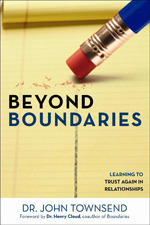 Learn how to discern when true change has occurred, develop mature passion that lasts, and restore former relationships to a healthy dynamic in Beyond Boundaries.
Learn how to discern when true change has occurred, develop mature passion that lasts, and restore former relationships to a healthy dynamic in Beyond Boundaries.
The post Love Conquers All and Other Lies appeared first on Boundaries Books.
January 29, 2015
The Secret Power of Suffering
 The apostle Peter said in 1 Peter 4:1 – 2, “Since Christ has suffered in the flesh, arm yourselves also with the same purpose, because he who has suffered in the flesh has ceased from sin, so as to live the rest of the time in the flesh no longer for the lusts of men, but for the will of God.”
The apostle Peter said in 1 Peter 4:1 – 2, “Since Christ has suffered in the flesh, arm yourselves also with the same purpose, because he who has suffered in the flesh has ceased from sin, so as to live the rest of the time in the flesh no longer for the lusts of men, but for the will of God.”
These words show how the apostle Peter changed from a man who avoided suffering to one who valued it. In the beginning he did not value the idea of suffering. When Jesus told his disciples that he was going to suffer and die, Peter rebuked Jesus and said there was no need for that (see Matthew 16:21 – 23). Jesus promptly replied, “Get behind me, Satan! You are a stumbling block to me; you do not have in mind the concerns of God, but merely human concerns.”
Jesus taught a profound lesson on the value of suffering: “Whoever wants to be my disciple must deny themselves and take up their cross and follow me. For whoever wants to save their life will lose it, but whoever loses their life for me will find it” (Matthew 16:24 – 25). Jesus calls his followers to embrace suffering.
 And Peter learned this lesson. The same Peter who thought suffering and death should not be included in the plan later said, “Since Christ suffered in his body, arm yourselves also with the same attitude, because whoever suffers in the body is done with sin” (1 Peter 4:1, emphasis added).
And Peter learned this lesson. The same Peter who thought suffering and death should not be included in the plan later said, “Since Christ suffered in his body, arm yourselves also with the same attitude, because whoever suffers in the body is done with sin” (1 Peter 4:1, emphasis added).
Peter came to see suffering as armor! He came to see suffering as protection against sin. He came to see that if we go through the suffering we need to go through, then we are “done with sin” (or at least the sin that had to do with that particular growth step).
Sometimes growth means that we have to take some hard, painful steps. But in submitting to that kind of suffering, we reap the benefit in the end. Working out a difficult relationship, for example, is not easy. We might have to suffer the hard steps of opening up, facing conflict, etc. Overcoming an addiction usually requires facing the pain that is driving the behavior. But if we face these kinds of suffering, we move past the issues and are on to a better life. We can get done with whatever is holding us back. Just as an athlete embraces “no pain, no gain,” those who want to grow personally have to sometimes go through some hard steps to get there. But it is worth it.
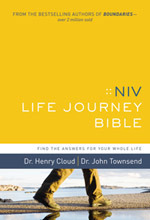 For more insightful biblical commentary from Drs. Henry Cloud and John Townsend, read the NIV Life Journey Bible, which combines the world’s most accessible Bible translation with exclusive boundaries teaching!
For more insightful biblical commentary from Drs. Henry Cloud and John Townsend, read the NIV Life Journey Bible, which combines the world’s most accessible Bible translation with exclusive boundaries teaching!
The post The Secret Power of Suffering appeared first on Boundaries Books.
January 24, 2015
The Boundaries Secret to a Sizzling Relationship
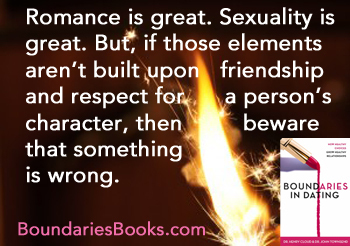 Romance is great. Sexuality is great. Attraction is great. But here is the key: If all of those are not built upon lasting friendship and respect for the person’s character, something is wrong.
Romance is great. Sexuality is great. Attraction is great. But here is the key: If all of those are not built upon lasting friendship and respect for the person’s character, something is wrong.
A real and lasting relationship must be built upon friendship first. You are going to spend a lot of time with that person. As one friend of mine said about picking her mate: “He was someone I knew I could grow old with. I liked spending time with him. And he made me laugh.” She also shared deep spiritual values and other commonalties with him as well, as she would with any other friend. They have been married for nearly thirty years.
The best boundary that you can have in your dating life is to begin every relationship with an eye toward friendship. Do not rush into any kind of romance. Keep your boundaries, physically, emotionally, and otherwise. But, how do you do this?
Spend time getting to know someone in nonromantic ways. For example:
Spend time with that person in groups of other friends.
How well does he or she fit in? How well do you fit in with his or her friends?
Does he or she even have friends?
(If they do not have long-term friendships, that is a bad sign.)
If you do not allow yourself to rush into falling for someone that you have not become friends with first, you will be more sure when you let yourself go to the next step. Certainly you might find yourself having all sorts of feelings. Enjoy them. But do not believe them. Only believe your experience of getting to know a person and seeing if you can share at a deep level.
See if you find that he or she is a person of the kind of character you would trust as a friend. And as important as all of that, see if that person is a person that you would like spending time with if there were no romance at all. That is the one true measure of a friend, a person with whom you like to spend time, having no regard to how you are spending it. “Hanging out” is fulfilling in and of itself. And that, long-term, requires character, and in the deepest of friendships, shared values as well. You would want your best friends to be honest, faithful, deep, spiritual, responsible, connecting, growing, loving, and the like. Make sure that those qualities are also present in the person you are falling in love with.
Keep your boundaries. We guarantee that being lovers with someone you would not want to be friends with is no good thing at all.
 Get more helpful advice to build the best dating relationship and find the love of your life in Boundaries in Dating by Dr. John Townsend and Dr. Henry Cloud.
Get more helpful advice to build the best dating relationship and find the love of your life in Boundaries in Dating by Dr. John Townsend and Dr. Henry Cloud.
The post The Boundaries Secret to a Sizzling Relationship appeared first on Boundaries Books.
January 22, 2015
Q&A with Dr. John Townsend: Setting Boundaries with Your Ex-Spouse
 Question:
Question:
Dr. Townsend:
I am divorced and having difficulty setting boundaries with my ex-husband. Our conversations are awkward around our children. He lavishes them with toys while I feel like the disciplinarian. What do good boundaries look like in this situation?
First, let me say that I’m sorry to hear about your situation. I’m sure it can feel uncomfortable to be at odds with your ex-spouse in front of your children.
This issue is always a tough one. First, appeal to your ex-spouse about the need for your kids to have an integrated set of parents, even though you aren’t married to each other. Tell him, “Our children need as close to the same environment of warmth and structure in both homes.” Add to that, “I want us to have the kind of relationship that I am open to your feedback on my parenting, and that you do the same.”
Then say, “I appreciate how generous you are with our kids with the great gifts. But, I would appreciate your being a bit less lavish, and adding more reasonable discipline and structure.”
Most ex-spouses will respond well to these types of comments. However, if he does not and refuses to change his behavior, try this approach. Instead of becoming the “Drill Instructor” parent to compensate for his lack of balance, become the “Grace and Truth” parent, who is very balanced and integrated in connection and structure.
This way, your kids will internalize at least one healthy home. And, they will be able to model that healthy home, as they grow up.
If you find it difficult to approach your ex-spouse and have a productive conversation, I recommend reading these two resources:
 Boundaries
Boundaries
Chapter 9 – “Boundaries and Your Spouse”
How to Have That Difficult Conversation You’ve Been Avoiding
Chapter 21 – “How to Have Difficult Conversations with Your Spouse”
Click on the book title links above for details and purchasing
Got a question for Dr. Townsend? Send them to us via email at: BoundariesBooksTeam@gmail.com
Due to Dr. Townsend’s busy schedule, not all questions will be able to be addressed and answered.
The post Q&A with Dr. John Townsend: Setting Boundaries with Your Ex-Spouse appeared first on Boundaries Books.
January 18, 2015
How to Tame a Child’s Temper Tantrums
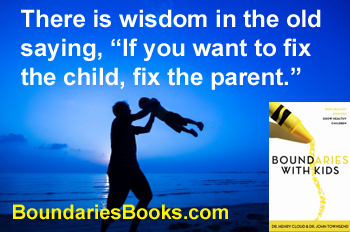 Seven-year-old Taylor pitched a titanic temper tantrum with his mother. Sometimes, she wondered if setting boundaries with kids was actually possible. Taylor fought any “do” or “don’t” she said. Finally, his mom went to his bedroom to talk to him. As she opened the door, a cup perched on the top of the door tipped over, covering her from head to toe with milk.
Seven-year-old Taylor pitched a titanic temper tantrum with his mother. Sometimes, she wondered if setting boundaries with kids was actually possible. Taylor fought any “do” or “don’t” she said. Finally, his mom went to his bedroom to talk to him. As she opened the door, a cup perched on the top of the door tipped over, covering her from head to toe with milk.
Any parent would have blown up at her child. Instead, Taylor’s mom said, her face dripping with milk, “Son, this is really serious. I’m going to have to take some time to figure out what will be happening to you. I’ll let you know.”
The next few hours were excruciating for Taylor as he waited in limbo. By that time, the mom had called her husband and worked out a plan. The plan included restrictions on Taylor’s time—such as no TV, limited outdoor time, and limited friend time—and consequences—such as shampooing the carpet and learning how to use a washing machine to clean Mom’s clothes.
To avoid feeling like the bad guy, Taylor joked with his dad that evening about the incident, saying, “Dad, wasn’t that kind of funny?”
His dad responded with a straight face, “No, it was really mean, son. You went too far with your anger. It was hard on your mom.”
“But I saw it on a TV show, and it was a good trick.”
“Taylor,” his dad said firmly but not harshly, “I really don’t want to talk about any part of this behavior being funny. It just wasn’t.”
A few hours later, the boy’s mother overheard Taylor saying to his little sister, “No, Kelly, don’t laugh! The milk trick wasn’t funny. It hurts people.”
Taylor’s boundary with Kelly was far different from the one he had with Mom. It was love based and deliberate. Through some tough consequences with Mom and some verbal boundaries about reality with Dad, Taylor was metabolizing his own boundaries and becoming more empathic. He was developing a concern for the feelings of others. That’s what boundaries with kids are designed to do.
Children will sometimes go through a “good as gold” season after a temper tantrum. They will do unasked-for favors for others or obey without a lot of resistance. If you have withdrawn from or attacked the child, this season may be an attempt to regain connection with you. But if you are maintaining your attachment to your child, this behavior may occur because your child has met your limit, feels less out of control and fearful of his own impulses, and feels safe. This leads to a sense of gratitude and warmth toward his family.
Children who live in protest mode are still dependent on other people. Like a pinball, they bounce from parents to siblings to friends, complaining about their poor treatment at the hands of others. Their feelings and actions are motivated by what others do or don’t do to them. Children with healthy boundaries, however, aren’t driven by the control of others. Their view of life, the decisions they make, and responses to their environment are dictated by their own internal values and realities.
You can help your child attain this important aspect of mature boundaries. When he is throwing a temper tantrum or acting in “protest mode,” remember to validate his feelings yet still hold to your limit or consequence. Then say, “You know, the more you fight me, the less time you have for things you like to do. Then it will be time for bed. I’m willing to stop the argument if you are, then you can go play. What do you think?”
If the child isn’t ready to stop, he thinks you don’t mean what you say. Don’t give in, and don’t keep arguing. Stick to your guns. Eventually, he should realize that as long as he is giving up all this time reacting to you, you are in control of his precious time. Having to go to bed with less playtime will help him understand the principle of time management and making the most of every opportunity. From a loving, firm position, you can use boundaries with kids to help your child mature into taking control of his or her life, character, and morality.
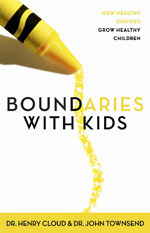 Get more proven advice to raise kids who take responsibility for their actions, attitudes, and emotions in Boundaries With Kids. Drs. Henry Cloud and John Townsend take you through the ins and outs of instilling the kind of character in your children that will help them lead balanced, productive, and fulfilling adult lives. Learn how to:
Get more proven advice to raise kids who take responsibility for their actions, attitudes, and emotions in Boundaries With Kids. Drs. Henry Cloud and John Townsend take you through the ins and outs of instilling the kind of character in your children that will help them lead balanced, productive, and fulfilling adult lives. Learn how to:
Set limits and still be a loving parent.
Bring control to a chaotic family life.
Define age-appropriate boundaries and consequences for your kids.
Click here to read a sample chapter, watch a teaching video, and purchase your copy.
“Family” image courtesy of arztsamui at FreeDigitalPhotos.net
The post How to Tame a Child’s Temper Tantrums appeared first on Boundaries Books.
January 15, 2015
Boundaries Q&A with Dr. John Townsend: Adult Child Who Refuses to Pay Back a Loan
 Question:
Question:
Dr. Townsend: What kinds of consequences are appropriate for a 39-year-old daughter who refuses to take responsibility for paying a college loan that her father and I co-signed in good faith?
First, let me say that I’m sorry to hear about your situation. I know that it can feel uncomfortable to be at odds with your adult child.
In this situation, your first decision is to approach your daughter in a vulnerable way and describe how her behavior is impacting you. You could say something like, “We love you, but we are struggling and feel a bit helpless because you aren’t paying us back. And, this problem is impacting our own financial well-being. We need for you to commit to a payment plan.”
If your vulnerability is not met by love and ownership from your daughter, then the second stage may be that you have set some limits, such as saying, “We are not going to be able to spend time with you as we used to. That’s because your behavior leads us to not trust you, until you begin paying back on the loan.”
If your daughter is unresponsive, the third stage is to either let the issue go and forgive her, but never risk finances with her again. Or, you could seek legal counsel for what your options are to get her to pay you back.
If you find it difficult to approach your daughter and have a productive conversation, I recommend reading these two resources:
 Boundaries
Boundaries
Chapter 10 – “Boundaries and Your Children”
How to Have That Difficult Conversation You’ve Been Avoiding
Chapter 25 – “How to Have Difficult Conversations with Adult Children”
Click on the book title links above for details and purchasing
Got a question for Dr. Townsend? Send them to us via email at: BoundariesBooksTeam@gmail.com
Due to Dr. Townsend’s busy schedule, not all questions will be able to be addressed and answered.
The post Boundaries Q&A with Dr. John Townsend: Adult Child Who Refuses to Pay Back a Loan appeared first on Boundaries Books.

